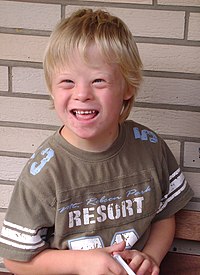
Photo from wikipedia
OBJECTIVES To correlate quality of life of children in terms of sleep, with their oral language skills, auditory processing and orofacial myofunctional aspects. METHODS Nineteen children (12 males and seven… Click to show full abstract
OBJECTIVES To correlate quality of life of children in terms of sleep, with their oral language skills, auditory processing and orofacial myofunctional aspects. METHODS Nineteen children (12 males and seven females, in the mean age 9.26) undergoing otorhinolaryngological and speech evaluations participated in this study. The OSA-18 questionnaire was applied, followed by verbal and nonverbal sequential memory tests, dichotic digit test, nonverbal dichotic test and Sustained Auditory Attention Ability Test, related to auditory processing. The Phonological Awareness Profile test, Rapid Automatized Naming and Phonological Working Memory were used for assessment of the phonological processing. Language was assessed by the ABFW Child Language Test, analyzing the phonological and lexical levels. Orofacial myofunctional aspects were evaluated through the MBGR Protocol. Statistical tests used: the Mann-Whitney Test, Fisher's exact test and Spearman Correlation. RESULTS Relating the performance of children in all evaluations to the results obtained in the OSA-18, there was a statistically significant correlation in the phonological working memory for backward digits (p = 0.04); as well as in the breathing item (p = 0.03), posture of the mandible (p = 0.03) and mobility of lips (p = 0.04). CONCLUSION A correlation was seen between the sleep quality of life and the skills related to the phonological processing, specifically in the phonological working memory in backward digits, and related to orofacial myofunctional aspects.
Journal Title: International journal of pediatric otorhinolaryngology
Year Published: 2017
Link to full text (if available)
Share on Social Media: Sign Up to like & get
recommendations!